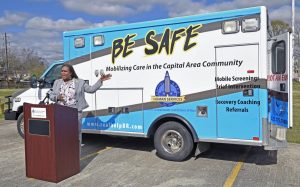
Natalie Cooley, with the Louisiana Dept. of Health STD Program, left, and Sheryl Johnson, with DHH Community Health Outreach Work, right, check out the interior of the new opioid ambulance at Capital Area Human Services’ press conference to introduce its new Opioid Mobile Outreach Team and unveil a repurposed ambulance that will be sent to “hot spots” where opioid use and ODs are known to be high Monday Feb. 3, 2020, in Baton Rouge, La.
Many people in the throes of opioid addiction are struggling to live another day without facing the pain of withdrawal. Their top priority is finding another fix, which often means sacrificing their health and safety.
That’s why Baton Rouge officials are bringing addiction services where they’re needed most. Local leaders hosted an open house Monday to unveil a repurposed ambulance that will enable the Capital Area Human Services opioid mobile outreach team to travel across the region delivering a range of services and supplies, including addiction counseling, testing for infectious diseases, overdose reversal drugs and clean needles.
Those are all services the agency is already providing, but the mobility is a change. The outreach team is part of a bigger push from the region’s largest government-funded provider of mental health and addiction services to address the local impacts of the nationwide opioid crisis. It’s one of several recommendations detailed in a 2018 report outlining proposed response efforts to the crisis in and around Baton Rouge.
The ultimate goal is to save lives and help people get clean, said Capital Area Executive Director Jan Kasofsky.
“You have to be alive before you can make the decision to get help,” she said. “That’s what we’re trying to do — first prevent overdose and death, then connect people with services.”
It was just last year when Capital Area Human Services started providing medication-assisted treatment options for people addicted to opioids. The options now include Vivitrol, which is an injection drug that blocks the opioid receptors in the brain and lasts about a month, and Suboxone. That recent development marks a shift from the increasingly outdated abstinence-only models of treatment that have been proven less effective in some cases.
“We need to embrace harm reduction,” Kasofsky said, emphasizing the complexities associated with the opioid crisis that have highlighted the challenges and failures of an approach focused on preaching abstinence alone.
The mobile team’s new repurposed ambulance, which was purchased using federal grant funds, will travel to areas across the region that have been identified through overdose data as “hot spots” for opioid use, officials said. It will start making rounds in the coming weeks, meeting people where they are.
Jan Laughinghouse, Capital Area’s director of addiction recovery services who will become interim executive director after Kasofsky steps down later this month, said for people struggling with addiction, a lack of reliable transportation can be enough to deter them from seeking help. Laughinghouse said the mobile unit includes a paramedic working alongside counselors and other providers.
The number of fatal opioid overdoses has grown rapidly over the past several years both in Louisiana and across the country — including an almost five-fold increase from 2012 to 2019 in East Baton Rouge alone, according to preliminary data from the parish coroner’s office.
The East Baton Rouge Metro Council rewrote a parish ordinance in 2017 to allow needle and syringe exchanges that would “prevent and reduce the transmission of communicable diseases.” That came after Louisiana legislators passed a bill tweaking the language in state law and allowing local governments to regulate such programs, which have gained support nationwide in recent years despite some critics claiming they could enable drug users.
East Baton Rouge Mayor-President Sharon Weston Broome pledged her support of the new program, which she said will improve access to life-saving services.
“What you see here with this mobile unit is what I call a smart approach to addressing a very serious issue,” Broome said during Monday’s open house. “This is taking us one step closer to Baton Rouge becoming a safe, hopeful and healthy community for everyone.”
